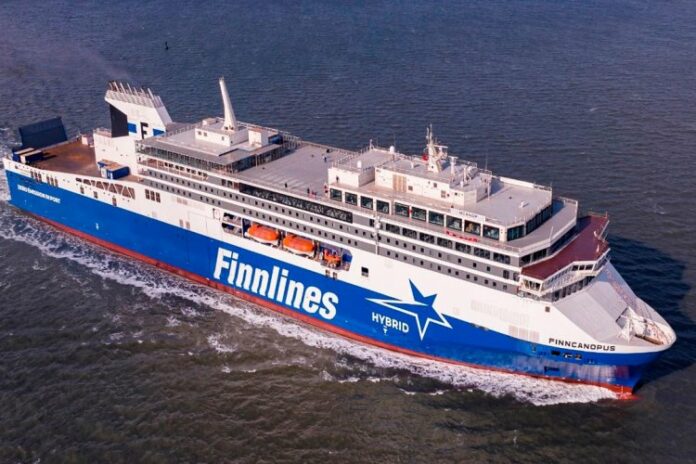Green Lane shipments will provide customers an opportunity to meet increasingly stringent environmental requirements and to achieve ambitious energy saving targets.
The 100% electricity powered shipments will be the cleanest option on the sea transportation market. This service will be available on the busy Naantali–Kapellskär route, which is operated by Finnlines’ newest hybrid ro-pax ships Finnsirius and Finncanopus.
The ships’ 5 MWh batteries are charged with onshore power while at berth, and the energy is utilised at sea to replace fossil fuel, thus enabling green transportation for certain freight units.
“Our utmost goal is to reduce emissions and we are already seeing concrete results. With the introduction of our new vessels, Finnsirius and Finncanopus, we have entered the hybrid era and can now offer our customers even more efficient and sustainable sea transport services. Although the cargo capacity of the vessels operating on the Naantali–Kapellskär route has increased significantly, yet absolute carbon dioxide emissions per nautical mile have decreased by 22%,” says Antonio Raimo, Line Manager at Finnlines.
The other Green Lane option utilises biofuels derived from renewable sources. The service will be available on short-sea shipping routes, which are of the utmost importance for the security of supplies in the Baltic Sea region, i.e. Naantali–Kapellskär, Malmö–Travemünde, Malmö– Świnoujście and Hanko–Gdynia.
By choosing the biofuel option, Finnlines commits to replacing the amount of fossil fuel needed for the transportation with biofuel. Use of biofuels can reduce well-to-wake greenhouse gas emissions of transport by up to 90% compared with conventional fossil fuels.
“We want to offer our customers concrete solutions to help them achieve their decarbonisation targets. Both solutions ensure low emissions – for example using biofuel can reduce carbon dioxide emissions by up to 700 kg per a trailer on the Hanko–Gdynia route,” says Merja Kallio-Mannila, Commercial Director at Finnlines.
The Green Lane will also be available for passengers on Finnlines’ passenger routes: Naantali–Långnäs–Kapellskär, Helsinki–Travemünde, Malmö–Travemünde and Malmö–Świnoujście. If passengers choose this option, Finnlines will consume renewable biofuels to replace the corresponding volume of fossil fuels and the emissions per a passenger on the route will decline.
Finnlines has been committed to offering economically and environmentally sustainable services for decades. The company has invested massively in enhancing energy efficiency and renewal of its fleet. During the last two decades Finnlines has ordered or purchased twenty vessels. The total investment has been nearly two billion euros.
In order to renew and upgrade the fleet, Finnlines has ordered three new methanol-powered vessels, which are expected to enter the route between Helsinki and Travemünde in 2028-2029.
“In April we announced of a new investment programme, which consists of three methanol-powered ro-pax vessels to enter the route between Finland and Germany. These new and previous investments will enable us to offer our customers fossil-free freight transportation. This has raised great interest and we are confident that the demand will grow in the future,” says Thomas Doepel, President and CEO at Finnlines.



